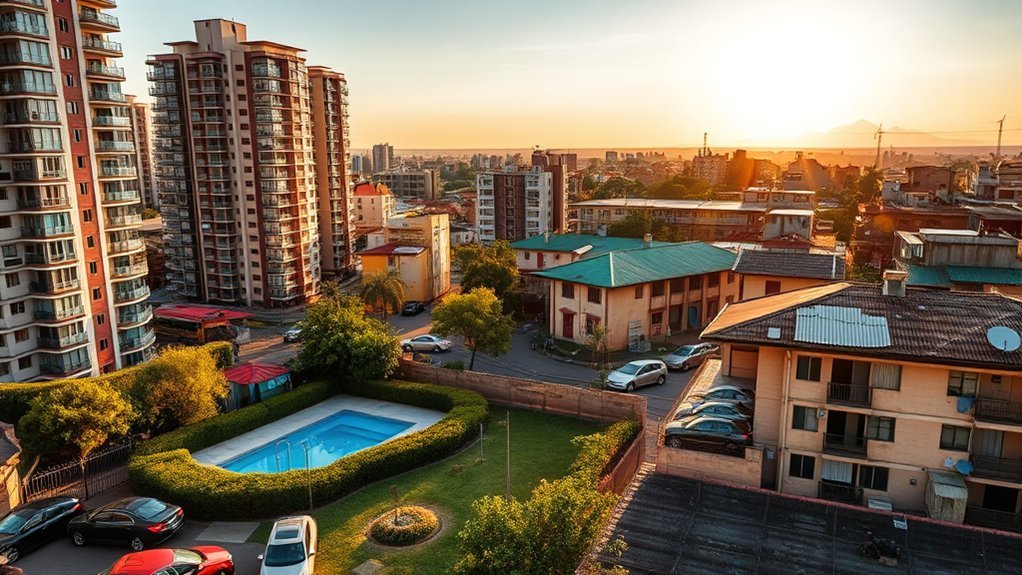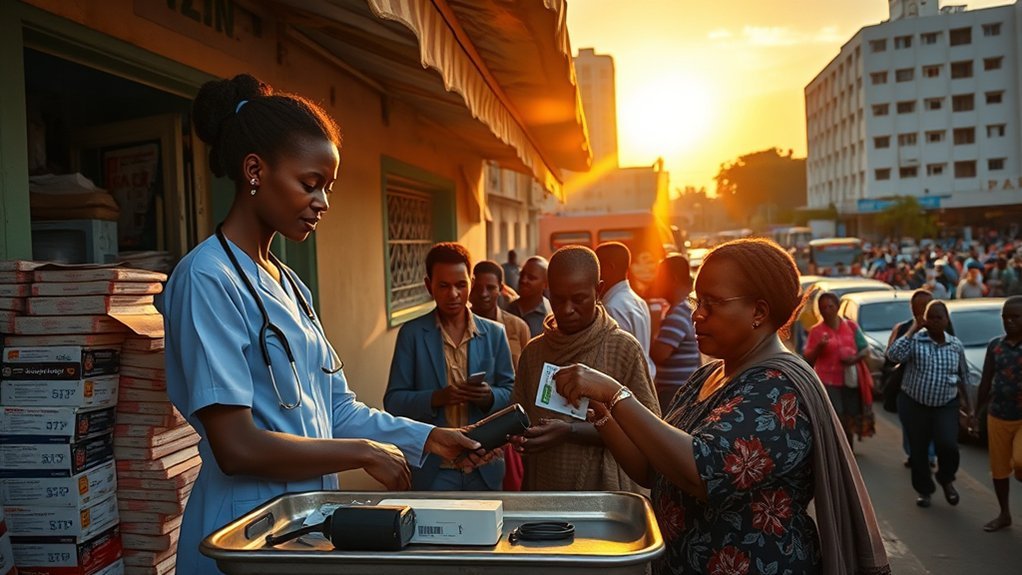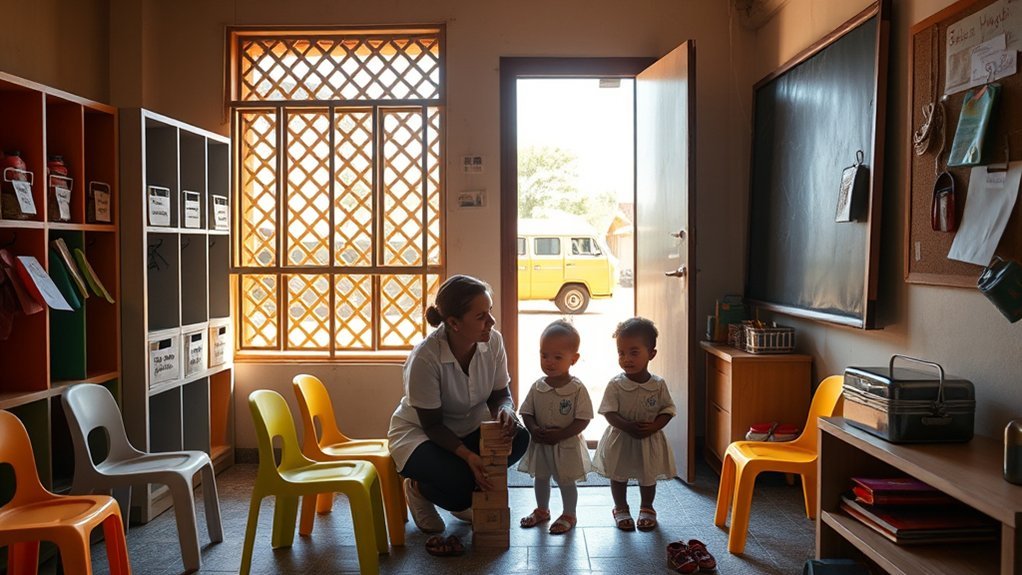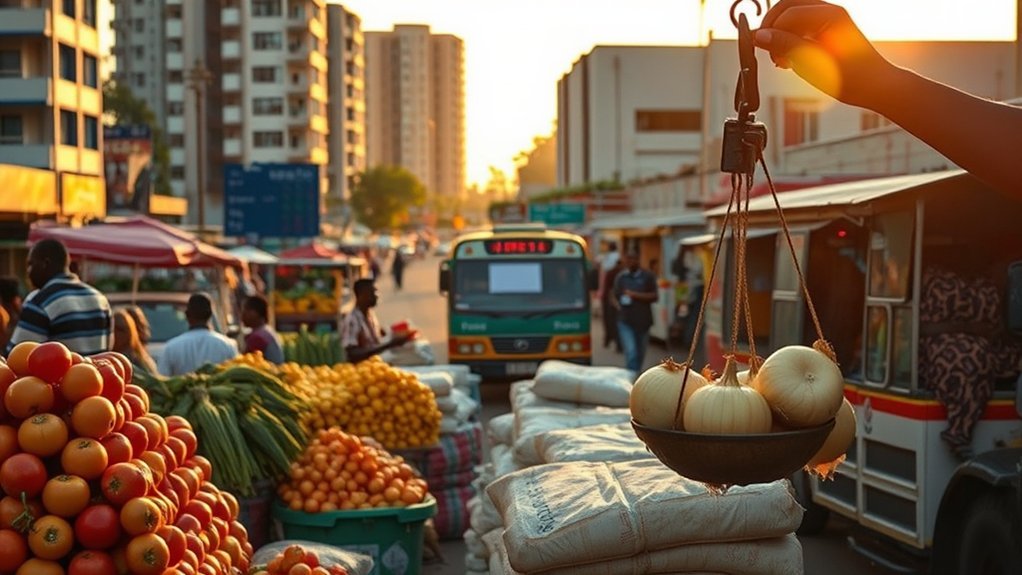You can live modestly in Kenya for about $300–$500 monthly in smaller towns or budget Nairobi areas, while a comfortable expat lifestyle in the capital typically runs $1,000–$2,500 per month. Rent is your biggest variable — expect roughly $250–$450 for a one-bed outside the city center and $400–$700+ inside the city center, and utilities and groceries typically run about $55–$150 and $80–$150 per person respectively. Public transport is cheap and healthcare varies, so plan for insurance if you want private care. Keep going and you’ll find detailed cost breakdowns and saving tips.
Cost of Accommodation and Housing Options

Although Nairobi’s rents are higher than elsewhere in Kenya, you’ll still find options that suit most budgets.
Although Nairobi rents top Kenya’s, affordable options remain across a range of budgets.
You’ll notice the cost of living shifts sharply between city and countryside: a one-bedroom in Nairobi’s city center typically runs about USD 400–700+, while outside the center it’s around USD 250–450. Three-bedroom city-center units often run near USD 900–1,400+, so rent in Kenya varies by location and size.
If you need cheaper accommodation, rural housing options can fall to USD 50–100. Renting in Nairobi often takes about 25–40% of your monthly outgoings, so factor housing into your budget early.
Compared with the UK, Kenyan housing prices are substantially lower, which makes relocation attractive for expatriates. When you choose, weigh proximity to work against lower rents farther out.
Prioritize what matters—commute, safety, and amenities—to pick the housing options that match your lifestyle and keep overall cost of living manageable.
Monthly Food, Utilities, and Household Expenses

Once you’ve settled on housing, your monthly groceries, utilities and everyday bills will shape how far your salary stretches. For monthly living, basic groceries run about $80–$150 per person; eating out at local spots costs $3–$5, while nicer restaurants are around $10.
Utilities for a ~915 sq. ft apartment average $55–$150 monthly (usage-dependent) for electricity, water and garbage, and home internet plans commonly cost KSh ~3,000–7,000, so you can budget reliably for essentials.
Your daily expenses depend on lifestyle: $20–$30 per day covers basic needs; $40–$50 buys more comfort. That makes the monthly cost of living vary widely — frugal individuals can keep totals low, while comfort seekers will spend considerably more.
Public transport is affordable: Nairobi does not have a universal monthly public transport pass; most commuters pay per ride, with typical matatu fares around KSh 50–150 per trip depending on route and peak times.
Transportation and Commuting Costs

Transport costs in Kenya are generally affordable and predictable, so you can plan commutes around a cheap public system or the variable costs of driving.
For everyday travel, transport in Kenya favors public transport: most riders pay per trip; typical matatu fares are about KSh 50–150 one-way depending on route and time of day. There’s currently no universal monthly pass in Nairobi.
Taxis/ride-hailing cost more: expect app-based pricing with a small base fare (around KSh 100) plus per-kilometer charges (around KSh 35/km), with surge and time charges possible, useful for short trips or when public options aren’t convenient.
If you drive, note that fuel prices fluctuate; as of November 2025, petrol in Nairobi is around KSh 184.52 per litre. Compare monthly fuel and maintenance to pay-per-ride public transport.
When budgeting living in Nairobi, factor transport alongside utility bills—basic utilities for a typical apartment average $55–$150 monthly—so you’ll see transport is a manageable portion of overall expenses if you choose the right mix of public transport and occasional taxis.
Healthcare, Insurance, and Medical Services

If you prefer private care, you’ll usually pay more upfront but get faster, higher-quality service—expect about $30 (roughly KSh 2,000–5,000) for a private clinic visit and plan on $100–$300 per month for extensive expat insurance.
You’ll find private healthcare favoured by expatriates because public healthcare can be overcrowded and underfunded; government spending was about $85 per capita in 2019. Without health insurance, medical expenses can be unpredictable, so budget conservatively.
- System update: Since Oct 1, 2024, Kenya’s SHIF replaced NHIF; contributions are typically 2.75% of gross pay (with minimums for informal/self-employed).
- Compare plans: look at coverage limits, evacuation, and outpatient benefits when choosing health insurance.
- Estimate out-of-pocket: private clinic visits, diagnostics, and meds add up quickly if you’re uninsured.
- Use a mix: rely on private healthcare for urgent or complex care; public healthcare may handle routine, low-cost services.
- Shop providers: premiums vary with age, coverage, and preexisting conditions—get multiple quotes to avoid surprises.
Decide based on risk tolerance, budget, and whether you need international evacuation or specialist access.
Education and Childcare Expenses

While international schools in Nairobi can cost you between about $5,000 and $20,000 a year, private schooling for a 12-year-old at top-tier schools often runs much higher—around $30,800–$37,330 annually plus a one-time ~${11,000} capital/entry levy—so weigh curriculum and language offerings against your budget. You’ll find public schools are free but often under-resourced compared with private education and international schools. Childcare ranges from informal, low-cost arrangements to pricier formal centers; choose based on reliability and safety. For higher education, university tuition typically falls between $1,380 and $5,000 annually, so factor long-term costs if you’re planning for tertiary study. Balance quality, location, and extracurriculars when comparing options.
| Option | Typical cost |
|---|---|
| Public primary/secondary | Free (limited resources) |
| International schools | $5,000–$20,000/yr (many top schools $30k–$37k) |
| Private (age 12) | $30,800–$37,330/yr + ~$11,000 entry |
| Childcare | Varies widely |
| Higher education | $1,380–$5,000/yr |
Typical Salaries, Budgeting Tips, and Cost-Saving Strategies

With formal-sector average wages around $550–$600 monthly (and $500–$800 in Nairobi offices), you’ll want to compare income against a comfortable single-person budget of about $1,000.
Prioritize essentials—rent often makes up 25–40% of spending and a city-center one-bedroom runs about $400–$700+—then trim daily costs by using public transport and cooking at home.
Those practical steps make it easier to stretch lower wages while still reaching modest savings.
Average Monthly Wages
On average you’ll see monthly wages around $550–$600 in Kenya’s formal sector, though urban office workers in Nairobi often earn $500–$800 while rural salaries can be lower.
That gap matters if you’re comparing average cost of living across major cities and smaller towns when moving to Kenya; wages are affordable compared to many Western incomes but lower than local comfortable budgets.
- Salary vs. needs: a ~$550 wage covers basics for some, but $1,000/month is typical for comfortable living.
- Urban premium: Nairobi salaries rise, yet rent and food do too.
- Rural trade-off: lower pay but lower housing and daily costs ($20–$30/day).
- Stretching income: prioritize rent, food, and transport to live within average monthly wages.
Practical Budgeting Tips
1 clear rule: treat rent as your budget anchor.
With one-bedroom city-center rent around $400–$700+ and $250–$450 outside, you’ll set realistic limits before other costs. Compare salaries—average formal-sector $550–$600 monthly, Nairobi $500–$800—to your target living standard and adjust expectations.
Budgeting starts by allocating rent, then food, transport, utilities. To live comfortably aim for $1,000 monthly; if your income is lower, prioritize cheaper areas and shared housing.
Use local markets and affordable eateries to cut grocery bills from $150–$250 down considerably. Track daily spending—$20–$30 for basics or $40–$50 for comfort—and cap nonessentials.
Save by using public transport, buying seasonally, and negotiating rents. Revisit your budget monthly to stay on top of costs in Kenya.
Frequently Asked Questions
What Is a Good Salary to Live in Kenya?
About $1,000 monthly gives you comfortable living in Kenya; average salary covers basics. Consider cost factors, lifestyle choices, urban vs rural differences, and expatriate experiences to compare needs and budget before committing.
Is $100 a Lot of Money in Kenya?
Like a brief lifeline, you’ll find $100 useful for local purchasing and budget planning; in cost comparison it’s modest against monthly living expenses, covers food or transport short-term, but won’t meet rent due to currency value limits.
How Much Is Rent in Kenya in US Dollars?
Average rent varies widely. In Nairobi, expect roughly $250–$700+ for a one-bedroom depending on area; in other major cities, about $200–$400; rural options can be $50–$100. Always check housing market details and rental agreements before deciding.
Can a US Citizen Live in Kenya?
Yes — you can live in Kenya, but you’ll need to meet Kenya’s entry and permit requirements (eTA for short-term stays; appropriate long-term visa/permit later via the eFNS portal). Expect cultural differences, join expat communities, compare cost of groceries, and use local or private healthcare options.
Conclusion
Living in Kenya can fit many budgets: rent and groceries vary by city, transport is cheaper than in many Western countries, and private healthcare or international schools push costs up. You’ll likely earn less than in developed markets but stretch your income with local shopping, shared housing, and public transit. Think of your budget like a safari map—plan routes, avoid costly detours, and you’ll find comfortable living without breaking the bank.


